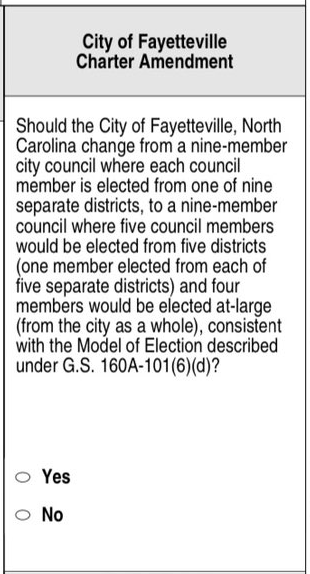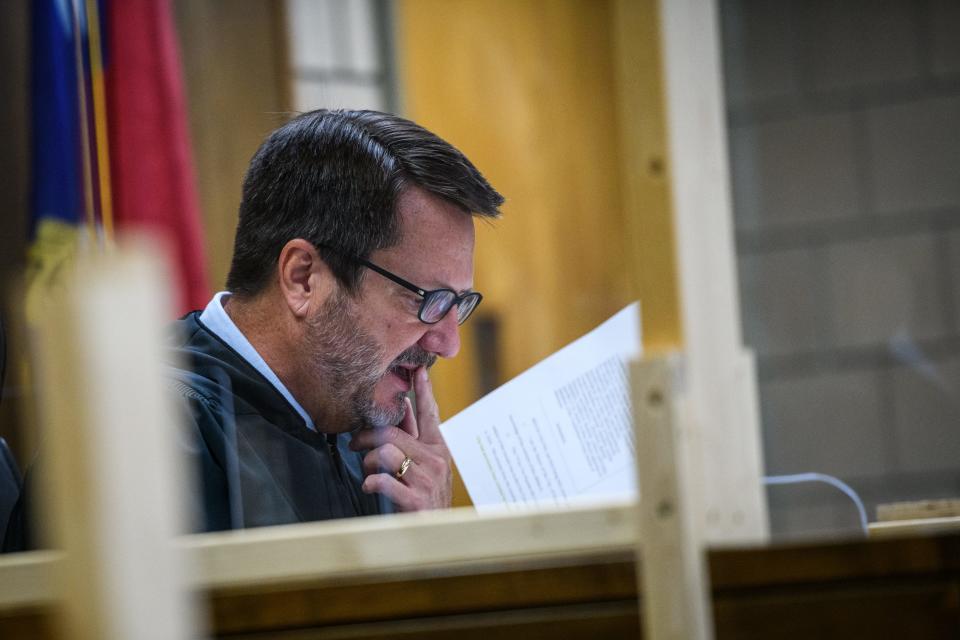Will ‘Vote Yes Fayetteville’ referendum be on ballots? Court expected to decide Friday

Fayetteville City Attorney Karen McDonald expects the North Carolina Court of Appeals to rule no later than Friday whether Fayetteville voters will decide in the November election if they want to dramatically alter the City Council with the “Vote Yes Fayetteville” referendum.
The Court of Appeals on Wednesday ordered lawyers for the city and for the Vote Yes Committee activists to submit legal briefs no later than 4 p.m. Thursday in a lawsuit as to whether the voters will get to vote on the question. McDonald on Wednesday evening said the possible outcomes include:
The Vote Yes referendum, which would convert four of the nine Fayetteville City Council seats from district seats to citywide seats, will be held this fall.
The vote Yes referendum will not be held this fall.
The Vote Yes referendum will be on the ballots this fall, but no votes on the question will be counted.
This third possibility stems from a looming deadline in this lawsuit: The election schedule says Sept. 9 — Friday — is the first day that county election offices statewide must start sending absentee ballots to voters who request them for the November election. As of this past Sunday, sample ballots prepared for Cumberland County have the Vote Yes referendum question on them.

The city’s lawyers told the Court of Appeals the city does not want the third possibility to take place.
“A local board of elections should not be forced to print ballots that are invalid,” they said in a court filing. “Yet that is precisely what the trial court’s decision mandates, and in the absence of a temporary stay and writ of supersedeas, that is precisely what will occur.”
Cumberland County Board of Elections member Linda Devore does not expect this third possibility to happen.
She said late Wednesday no ballots for Fayetteville residents will be printed until the Court of Appeals takes action. “So, as of now, no ballots will become available on Friday to voters, and until further notice,” she said.
City Council vote: 'Vote Yes' initiative blocked from November ballot
Lawsuit filed: Vote Yes advocates ask judge to overturn the City Council decision
The lawyers for the Vote Yes Committee contend the City Council broke the law by refusing to put the question on the ballot after receiving 5,009 voter signatures in a petition to compel the matter being put to a vote of the people.
“Although approval of the ballot referendum is purely ministerial, the City Council, after two meetings, willfully refused to authorize a special election,” they wrote. “This has irreparably harmed constitutionally protected rights of the Plaintiffs and over 5,000 other voters.”
If the Court of Appeals delays the Vote Yes Fayetteville referendum to a later date, state law says the soonest that the referendum could be held would be during the November 2023 Fayetteville City Council elections, said Gerry Cohen, a state election law expert and a member of the Wake County Board of Elections.
‘Vote Yes’ ballot initiative started in 2021
Fayetteville’s Vote Yes referendum got started early 2021 when former members of the City Council and others formed the Vote Yes Committee. In March of that year they contacted the Cumberland County Board of Elections for guidance on how to start a petition drive to gather at least 5,000 signatures from voters in favor of the ideas.
With 5,000 signatures on a proposal to change the city charter, state law says the city shall hold an election to see if the voters will approve the idea.
The Vote Yes signatures were submitted to the Cumberland County Board of Elections office in March of this year. The office confirmed it had 5,009 valid signatures. The referendum appeared to be on track for the November election.
But then the City Council voted 6-4 on Aug. 22 against putting the question on the November ballot. Council members who voted against holding the referendum expressed reservations as to whether the Vote Yes Committee’s voter petition drive was conducted in accordance with state election laws governing voter initiatives.
Judge says: Vote Yes referendum will go before voters
City Council says: We want the NC Court of Appeals to reverse the judge’s ruling.
In particular, the council members questioned whether a notice of the petition drive had been filed with the county elections office.
Following the Aug. 22 council vote, Say Yes Committee members Bobby Hurst, Karl Merritt and Suzanne Pennink sued to force the City Council to put the measure on the ballot this fall.
Judge rules against the City Council
On Sept. 1, Cumberland County Superior Court Judge Jim Ammons ordered the City Council and the county Board of Elections to put the Vote Yes referendum on this fall’s ballot despite the objections of a majority of the council. The City Council voted the next morning to appeal Ammons’ ruling.

A three-judge panel of the Court of Appeals on Wednesday unanimously blocked enforcement of Ammons’ orders pending the outcome of the appeal.
The Court of Appeals told each side to submit briefs by 4 p.m. Thursday regarding whether Ammons had any authority to select the date for the Vote Yes referendum and to identify the next possible dates to hold the election.
The Vote Yes proposal
The current city charter specifies that Fayetteville has nine council members elected from districts, plus a mayor elected citywide. The mayor gets a vote on the council.
Vote Yes would change this to five council members elected from districts, four elected citywide, plus the mayor elected citywide. The mayor would continue to have a vote on the council.
Under the current charter, all city voters may vote for two people on the City Council: The mayor and their district council member. The Vote Yes proposal would give each voter influence over six people on the City Council: The mayor, their district council member and the four at-large members
The Vote Yes measure has been advanced by its activists as a means of giving each voter more say on the City Council.
Mayor Mitch Colvin is among those who adamantly oppose the proposed change to the city charter.

“The City appealed the decision of Judge Ammons to the NC Court of Appeals because the integrity of the electoral process is the most sacred tenet of a functioning democracy,” he said in an email. “The proponents of the Vote Yes Petition, in their efforts to gerrymander city council voting districts, failed to comply with the strict requirements of NC law which mandates that a Notice of Circulation be filed with the County Board of Elections.”
Is Vote Yes exempt from the ‘strict requirements?’
Colvin’s comment about the “strict requirements of NC law” refers to a key question in the Vote Yes Committee’s lawsuit: Was the committee required to submit a formal petition notice to the Cumberland County Board of Elections?
Ammons ruled the Committee had met the petition notice requirement when members met with the Cumberland County elections director in March 2021, told her of their plans, and filled out some related paperwork at her direction.
None of the paperwork was specifically a “notice” of plans to circulate a petition. However, the election office had no specific “notice of circulation” forms for people to file when they start a petition drive, according to comments in court during the Sept. 1 hearing.
Two lawyers who serve on county elections boards: Cohen of Wake County and Devore of Cumberland County, told The Fayetteville Observer no law required the Vote Yes Committee to officially tell the county Board of Elections that it planned to start its petition drive.
Both said the statute mandating a formal notice of circulation of a petition applies to petition drives that are to be filed with the county Board of Elections. But petitions to change a city charter — which is what the Vote Yes referendum would do — are to be filed with the city clerk, the law says, not the Board of Elections.
The legislature in 1971 deleted a “notice of circulation” requirement for petition drives involving changes to city charters, Cohen said on Wednesday evening. Cohen spent his legal career as an advisor for the state legislature and wrote many of the state’s election laws.
Senior North Carolina reporter Paul Woolverton can be reached at 910-261-4710 and pwoolverton@gannett.com.
This article originally appeared on The Fayetteville Observer: Court expected to decide Friday on ‘Vote Yes Fayetteville’ referendum

